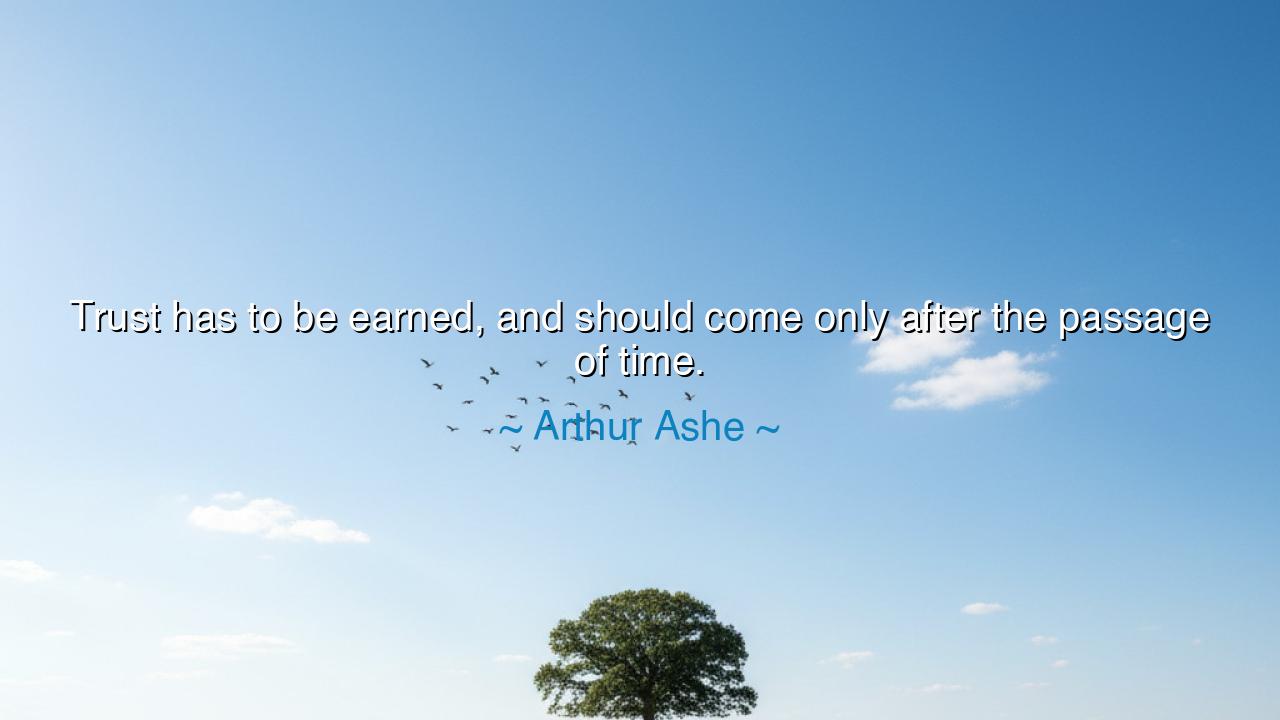
Trust has to be earned, and should come only after the passage






Arthur Ashe, the noble champion who rose not only as a master of tennis but as a beacon of dignity and wisdom, once declared: “Trust has to be earned, and should come only after the passage of time.” These words, born from a life that knew both triumph and trial, speak with the authority of one who understood human character. Ashe, who faced prejudice, illness, and the weight of fame, knew that trust is not a gift freely scattered like seed in the wind, but a treasure that must be proven worthy through deed and endurance.
The meaning of this teaching is simple yet profound. Trust is the foundation of all relationships—between friends, lovers, leaders and the people they serve. But unlike love or kindness, trust cannot be granted instantly. It must be tested, proven through action, and confirmed by consistency. The passage of time acts as the crucible in which words are weighed, promises are measured, and character is revealed. Without such testing, trust is fragile, easily broken, and costly to repair.
History offers powerful witnesses to this truth. Consider the life of Abraham Lincoln, who endured ridicule and doubt in his early political career. Many distrusted him, seeing only his failures and his unpolished manner. Yet over the years, through patience, honesty, and unwavering principle, he earned the trust of a divided people. By the time of the Civil War, when the very union trembled on the edge of collapse, that trust gave him the strength to lead a nation through its darkest hour. Without the passage of years, Lincoln’s steady reliability could not have been proven.
There is also the story of Julius Caesar, whose life shows the opposite truth. Though once beloved as a general who brought wealth and conquest to Rome, his hunger for absolute power corroded the trust placed in him. The Senate, once his ally, turned against him. In a moment, blades struck where loyalty had once stood. Trust, once broken, can transform into betrayal. This story reminds us that while trust takes years to earn, it can be shattered in an instant of greed or dishonor.
The lesson for us is clear: do not demand trust before you have proven worthy of it, nor give it lightly before it has been tested. In friendship, in love, in work, let the deeds of a person—not their promises—be the measure. The passing of days will reveal truth that words alone cannot hold. And when you yourself seek to be trusted, live with such consistency and integrity that others may place their confidence in you without fear.
In practice, this means living transparently, keeping your word, and honoring commitments even when they are costly. It means watching carefully how others act over time, especially in difficulty, for character is revealed not in moments of ease but in moments of trial. Let your trust be like a fortress—strong, but not built overnight. And let your own actions be stones in the fortress of another’s confidence in you.
Therefore, children of tomorrow, remember Arthur Ashe’s wisdom: trust is not given, it is earned; it does not arrive in haste, but only after time reveals truth. Guard it well, for it is more precious than silver, and once broken, it may never be whole again. Place your trust wisely, prove yourself worthy of it daily, and build your relationships not on fleeting words but on enduring deeds. For in the end, those who honor trust will live surrounded by loyalty, and those who betray it will find themselves alone.






AAdministratorAdministrator
Welcome, honored guests. Please leave a comment, we will respond soon